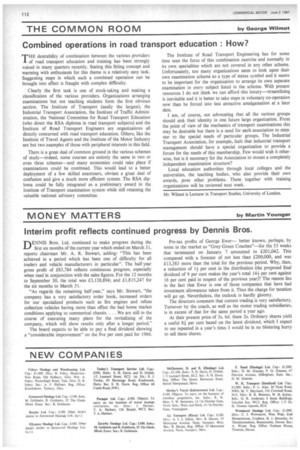THE COMMON ROOM Combined operations in road transport education : How?
Page 114

If you've noticed an error in this article please click here to report it so we can fix it.
rr HE desirability of combination between the various providers I of road transport education and training has been strongly voiced in many quarters recently. Stating this fitting concept and warming with enthusiasm for this theme is a relatively easy task. Suggesting steps in which such a combined operation can be brought into effect is fraught with complex difficulty.
Clearly the first task is one of stock-taking and making a classification of the various providers. Organizations arranging examinations but not teaching students form the first obvious section. The Institute of Transport (easily the largest), the Industrial Transport Association, the Institute of Traffic Administration, the National Committee for Road Transport Education (who direct the RSA diploma in road transport subjects) and the Institute of Road Transport Engineers are organizations all directly concerned with road transport education. Others, like the Institute of Travel Agents and the Institute of the Motor Industry are but two examples of those with peripheral interests in this field.
There is a great deal of common ground in the various schemes of study—indeed, some courses are entirely the same in two or even three schemes—and many economies could take place if examinations could be combined. This would lead to a better deployment of a few skilled examiners, obviate a great deal of confusion and give a much more efficient system. The RSA diploma could be fully integrated as a preliminary award in the Institute of Transport examination system while still retaining the valuable national advisory committee.
The Institute of Road Transport Engineering has for some time seen the force of this combination exercise and normally in its own specialities which are not covered in any other scheme. Unfortunately, too many organizations seem to look upon their own examination scheme as a type of status symbol and it seems to be important for the organization to arrange its own separate examination in every subject listed in the scheme. With present resources I do not think we can afford this luxury—streamlining is inevitable and it is better to take steps in voluntary co-operation now than be forced into less attractive amalgamation at a later date.
I am, of course, not advocating that all the various groups should sink their identity in one future large organization. From the point of view of the mechanics of transport examinations this may be desirable but there is a need for each association to minister to the special needs of particular groups. The Industrial Transport Association, for example, feels that industrial transport management should have a special organization to provide a forum for the needs of this membership. Few would wish it otherwise, but is it necessary for the Association to mount a completely independent examination structure?
Local education authorities through local colleges and the universities, the teaching bodies, who also provide their own awards, pose other problems. These together with training organizations will be reviewed next week.
Mr. Wilmot is Lecturer in Transport Studies, University of London.




























































































































































